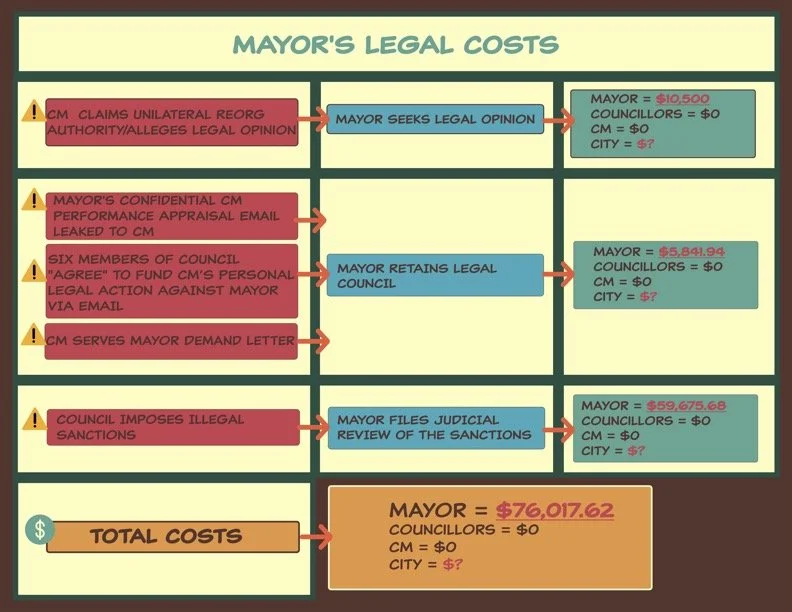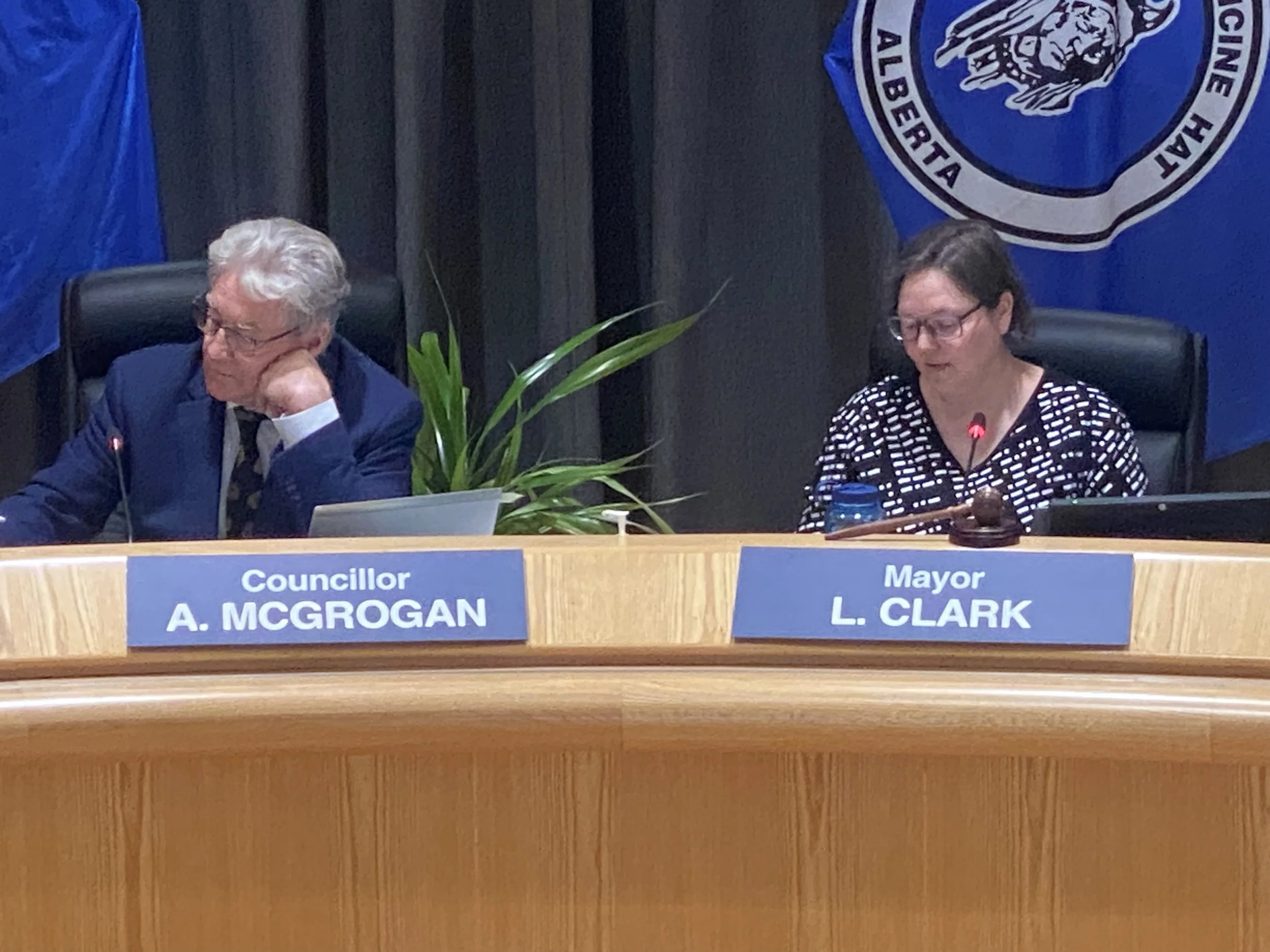Council Rejects Bulk of Mayor’s Legal Fee Reimbursement
An unidentified spectator at Monday’s council meeting voices his displeasure with council rejecting the bulk of Mayor Linnsie Clark’s legal expenses incurred over the past two years. (Photo Kelly Allard)
If there one thing which is clear about the City of Medicine Hat’s indemnity policy following the issue being raised by Mayor Linnsie Clark’s request to have her lawyer fees covered, it’s that council can override its own rules regarding reimbursement of legal costs.
As first and exclusively reported by the Medicine Hat Owl last year – and confirmed by council during Monday’s regular meeting – city councillors overrode its indemnity policy to pay legal fees incurred by city manager Ann Mitchell last October.
Those fees totaling $6,500 were paid out despite the city spending $12,000 on a legal opinion recommending Mitchell not be indemnified.
While that October vote also featured a pay raise for the now suspended city manager, council wasn’t so generous with Clark, denying two of three claims for indemnification Monday.
Clark recused herself – albeit reluctantly – from the debate over the issue of more than $75,000 in legal fees incurred since July 2023 on a trio of issues. Those included obtaining an independent opinion regarding actions taken by Mitchell surrounding a corporate reorganization and a defence against a November 2023 threat by the city manager of a defamation lawsuit. Those costs were broken down to $10,500 and $5,800 respectively.
The bulk of the indemnification claim, nearly $60,000, was the result of a judicial review of sanctions placed against Clark following a code of conduct violation for her questioning of Mitchell during an August 2023 council meeting.
While the substantive issue of the code of conduct complaint was upheld by a King’s Bench justice in an August 2024 ruling, the sanctions were found to be completely disproportionate, earning a stern rebuke of council’s decision making.
The $60,000 for the reimbursement fell on a three-to-three tied vote with Coun. Ramona Robins failing to be present at the council meeting despite her commitment to do so while on sabbatical and the absence of Coun. Darren Hirsch.
In arguing in support of paying the judicial review expenses, Coun. Andy McGrogan acknowledged the judicial decision but also blamed the mayor for not trying to deal with the issue before going to court.
A graphic outlining Mayor Linnsie Clark’s view of the legal expenses incurred over the past two years.
“I’m of the personal belief she had many opportunities to say she could have handled the meeting on Aug. 21 (2023) differently and meet prior to the judicial review and this, in all likelihood, would have all gone away,” he said.
But likely and guaranteed are two different levels of commitment which Clark has pointed out in past debates on the issue.
Despite the statement, McGrogan stated, “for the sake of this community, we do need to move on.”
McGrogan along with councillors Shila Sharps and Alison Van Dyke voted in favour of the reimbursing the $60,000.
On the nay side, Coun. Robert Dumanowski proposed half those costs be reimbursed with the amendment failing to garner support.
Dumanowski acknowledged the judicial review, “could have, should have been handled differently.”
But, he added, the city tried to mediate the legal issue through hiring municipal governance consultant George Cuff as well as enlisting the help then Minister of Municipal Affairs Ric McIvor.
“We really had no choice but to go through to the end from the standpoint our multiple attempts not being heeded,” said Dumanowski of the judicial review.
Again, Clark rebuked the description of those efforts being attempts to resolve a legal action. The publicly available information regarding those attempts appear to reveal attempts at rebuilding a relationship between the city manager, council and the mayor.
“The best I can do is 50 per cent (reimbursement) because there is a shared responsibility and with a shared responsibility comes a shared consequence,” Dumanowski stated.
The issue of Clark obtaining an outside legal opinion which found the city did not follow its procedure bylaw during a corporate reorganization – an issue backed by findings in the municipal inspection report – also failed to result in indemnifying the mayor.
Arguing in support of paying the $10,500, Sharps highlighted that Mitchell claimed she had a legal opinion backing the way the reorganization was handled. But it was a legal opinion which ended up never existing.
“It started with Mayor Clark not being given the truth and being given all the information when she asked,” said Sharps, later adding the mayor was given, “false data.”
But the fact Clark went out and got the independent legal opinion providing a correct interpretation of the city’s bylaws without notice to other councillors was cited by a majority of council as the reason not to repay those funds.
“Doing this without consultation I think is very problematic. I think it sets a precedent that a mayor or councillor can seek legal counsel for anything they perceive to be an issue, without consultation. And then present a bill expecting reimbursement,” argued Coun. Van Dyke.
Only Sharps voted in favour of the reimbursement of the $10,500.
But council did support Clark’s $5,800 in legal fees she incurred after receiving a letter from Mitchell threatening a defamation lawsuit.
That passed unanimously.
The issue of the mayor’s legal fees being reimbursed may not be over yet as the current indemnity policy is under review by the Administrative and Legislative Committee.




